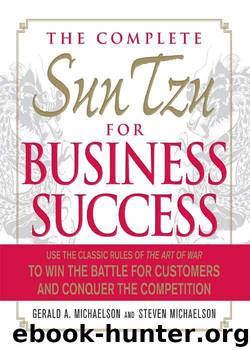The Complete Sun Tzu for Business Success by Gerald A. Michaelson & Steven Michaelson

Author:Gerald A. Michaelson & Steven Michaelson [Michaelson, Gerald A. and Michaelson, Steven ]
Language: eng
Format: epub
ISBN: 9781440528934
Publisher: Adams Media
Published: 2011-07-15T00:00:00+00:00
TAKE ADVANTAGE OF OPPORTUNITY
Execution Rules
• Manage opportunities as a good negotiator: Don’t overpay.
• Keep customers at the forefront of your decision making.
• Find metrics that disseminate customer-driven thinking.
The commander must create a helpful situation over and beyond the ordinary rules. By “situation,” I mean he should act expediently in accordance with what is advantageous in the field and so meet any exigency.
—Sun Tzu
Cagey negotiators leave their options open so they can take advantage of the best opportunity. When Michael Dell is interviewed about his company’s relationship with Intel (until their acquisition of gaming-computer maker Alienware, Dell used only Intel chips), he says, “We don’t have an exclusive arrangement with Intel.” That statement leaves the door open for Dell to have relationships with other microprocessor manufacturers and inherently works to keep Intel on its toes—and its price offerings to Dell competitive.
Every publicly held company needs to make its quarterly results. When negotiating for high-ticket items such as software, you can frequently improve the pricing you receive if you negotiate with a vendor who is having a subpar quarter. They will be much more amenable to giving you a price break to secure the sale. Accordingly, if you have flexibility in your timing or are talking to multiple vendors, probe and exploit the weaknesses that let you get the best price.
Sun Tzu was opportunistic in his operations. He advised, If the enemy leaves a door open, you must rush in. Seize the place the enemy values without making an appointment for battle with him. Sun Tzu took advantage of opportunities aggressively.
Taking advantage of opportunities means not overpaying in money, time, or the opportunity cost for your organization. You can avoid overpaying by constantly staying ahead of the curve on the areas you are looking at for opportunities. A current knowledge base helps detect and assess opportunities. Gut feelings and hunches play a part in business, but they must be backed up by research and knowledge of the marketplace. You can become a very good negotiator by doing a few things. Great buyers consistently follow a few guidelines:
They are always out testing the market. They meet with vendors they may not even want to do business with. This keeps their knowledge base constantly up to date. They know pricing—because they are always probing for a better price. They know about quality—because any good pricing conversation involves some quality discussion. They know trends, from multiple viewpoints, because they are always asking about what is new. This practice keeps great buyers constantly current on new developments in the marketplace.
They try to never get beholden to a vendor. Granted, that sometimes isn’t possible. (No drugstore can avoid selling Crest toothpaste.) But very frequently you can exert leverage by saying no to certain vendors or giving better placement to their competitors. Great buyers keep as much of their business “in play” with as many vendors as possible.
They are loyal to people who have been loyal to them. Test the market and maintain your flexibility, but don’t change vendors and relationships on a whim.
Download
This site does not store any files on its server. We only index and link to content provided by other sites. Please contact the content providers to delete copyright contents if any and email us, we'll remove relevant links or contents immediately.
Hit Refresh by Satya Nadella(9115)
The Compound Effect by Darren Hardy(8917)
Change Your Questions, Change Your Life by Marilee Adams(7725)
Nudge - Improving Decisions about Health, Wealth, and Happiness by Thaler Sunstein(7685)
The Black Swan by Nassim Nicholas Taleb(7095)
Deep Work by Cal Newport(7053)
Rich Dad Poor Dad by Robert T. Kiyosaki(6588)
Daring Greatly by Brene Brown(6494)
Principles: Life and Work by Ray Dalio(6395)
Playing to Win_ How Strategy Really Works by A.G. Lafley & Roger L. Martin(6199)
Man-made Catastrophes and Risk Information Concealment by Dmitry Chernov & Didier Sornette(5993)
Digital Minimalism by Cal Newport;(5743)
Big Magic: Creative Living Beyond Fear by Elizabeth Gilbert(5733)
The Myth of the Strong Leader by Archie Brown(5487)
The Slight Edge by Jeff Olson(5402)
Discipline Equals Freedom by Jocko Willink(5367)
The Motivation Myth by Jeff Haden(5196)
The Laws of Human Nature by Robert Greene(5149)
Stone's Rules by Roger Stone(5071)
